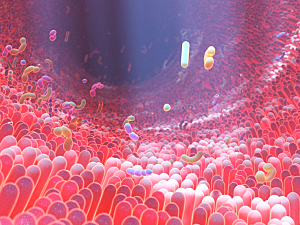Accumulating evidence suggests the gastrointestinal tract is an important site for SARS-CoV-2 infection. Studies based on whole-metagenome shotgun (WMS) sequencing have explored links between the human microbiome and SARS-CoV-2 infection, but these rely on reference genome databases and may miss the estimated 40% to 50% of gut species that lack a reference genome.
Taking a different approach, researchers at Brigham and Women’s Hospital analyzed WMS sequencing data by reconstructing microbial population genomes directly from microbiome samples of COVID-19 patients and controls. In Nature Communications, they report the creation of the first high-quality COVID-19–related genome catalog of the human microbiome. It identifies novel taxa and strain-level differences likely associated with the clinical manifestations of SARS-CoV-2 infection.
The authors are Shanlin Ke, PhD, a research fellow in the Channing Division of Network Medicine, Scott T. Weiss, MD, MS, associate director of the division, and Yang-Yu Liu, PhD, an associate scientist in the division.
Methods
By searching PubMed and online repositories, the researchers obtained metagenomic sequencing data on 541 nasopharyngeal and fecal samples from six cohorts that included both COVID-19 patients and control subjects without COVID-19.
The team used the data to reconstruct 11,584 metagenome-assembled genomes (MAGs) and identified 5,403 non-redundant MAGs (nrMAGs) at strain-level resolution.
Reduction of Strain Richness
For many species in the gut microbiome, there was a significant reduction in strain richness—the number of nrMAGs—in COVID-19 patients compared with controls. Moreover, some species lost multiple strains that have been identified as protective.
Patients who had recovered from COVID-19 differed more from controls than those currently ill with COVID-19. That finding supports the conclusion of a previous study published in Frontiers in Nutrition that gut microbiota may not be fully restored in COVID-19 patients even three months after a negative COVID-19 test.
The Microbiome and COVID-19 Pathogenesis
Machine learning models demonstrated that gut microbiome signatures at the nrMAG level could distinguish COVID-19 patients from healthy controls with high accuracy. In addition, the signature identified from one cohort could diagnose COVID-19 across the others, independent of the effects of host genetics and environmental factors. The gut microbiome signatures can also predict the progression of COVID-19.
The researchers also identified a set of nrMAGs that have a potentially causal role in the clinical manifestations of COVID-19 and determined functional pathways that potentially interact with SARS-CoV-2 infection.
Future Directions
The main findings of the study were largely validated in 341 microbiome samples from three independent cohorts. The genome catalog will be an important resource for directly investigating the genomic content of COVID-19-relevant microbial strains.
It’s possible that symptoms of “long COVID-19” are associated with changes in the gut microbiome, and dedicated studies are needed to explore that issue.
